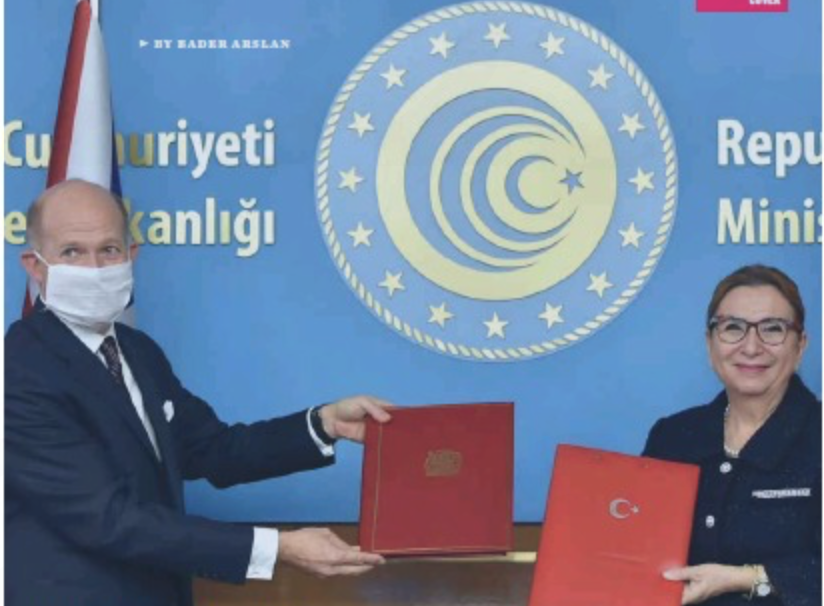TURKEY has signed its first Free Trade Agreement (FTA) with the United Kingdom (UK), which is not anymore included in the Customs Union after its exit from the European Union (EU). Signed by Trade Minister Ruhsar Pekcan and Ambassador Dominick Chilcott during an online ceremony attended by UK Secretary of International Trade Liz Truss last week, the agreement will come into force on January 1.
The agreement has also saves an average of 10% in tariffs for all of Turkey’s automotive and electronics sectors and almost the entire textiles and apparel sectors exporting to the UK. Approximately USD 7 bn worth of exports from Turkey will enter the UK market without facing a tax wall. Exporters are relieved but transporters still have visa and document issues in transit countries that need support from the UK.
What are some of the other pros and cons?
If the accelerated process works, the agreement is expected to enter into force as of January 1. The free trade agreement Turkey signed with the UK on Tuesday secures £18.6 billion worth bilateral trade, UK Trade Secretary Liz Truss said. “Now we are looking forward to working for a more specific and ambitious trade agreement with Turkey in the near future,” she added. The deal with Turkey is the fifth biggest after Japan, Canada, Switzerland and Norway, among the free trade agreements the UK signed with 62 countries during the Brexit process ends in January.
A RARE TRADE SURPLUS
The UK-Turkey bilateral trade volume is USD 25.25 bn. Turkey exports twice as much as it imports to the UK, giving it the largest trade surplus of any trading partner. Turkey’s exports to the country in 2019 was USD 11.2 bn, while imports were USD 5.6 bn. In 2020, exports are expected to decrease by 4% to USD 10.7 bn and imports are expected to increase by 1% to USD 5.7 bn, due to the pandemic effect. Turkey’s exports to the UK consist of automotive, at USD 2.2bn, machinery and equipment, at USD 2.1bn, textile-apparel, at USD 1.8bn and gold and jewelry at USD 1.2 bn. Leading import items from the UK are machinery at nearly USD 2bn and iron and steel worth USD 800m. Gold, automotive, plastic and pharmaceuticals are other important import items.
WHAT DOES IT MEAN FOR TURKEY?
When it comes to third countries, the Customs Union between Turkey and the EU has two structural weaknesses. First, FTAs between the EU and other countries do not transfer any benefits to Turkey. It is completely up to the third country to sign an agreement with Turkey or not. Second, Turkey can’t sign an FTA with a country before it signs one with the EU. That is why Turkey had to wait for the UK to close its Brexit deal with the EU.
Many problems would have arisen in bilateral trade from January 1 if Turkey and the UK had not signed the Free Trade Agreement. Two-thirds of Turkey’s exports (of about USD 7bn) would be subject to customs duties. Automotive and electronics, almost all textiles and ready-made clothing, would be subject to an additional 10% tax. A similar situation would apply to the UK’s exports to Turkey.
NEGOTIATIONS STARTED 4 YEARS AGO
In order to avoid such problems, there was only one week for an agreement between the UK and Turkey, before the EU-UK deal enters into force. However, the two countries had started negotiations before. It was decided to establish a working group for an FTA between the UK and Turkey at the end of 2016. Formal negotiations between the parties began at the end of 2017 and lasted four years. With the FTA, an agreement was reached on many issues.
Turkey has had a surplus in its trade with the UK since 2001. The surplus was more than USD 5bn in 2019 and reached USD 4.3bn from January- October this year. Sector representatives believe that this sets a unique example, especially considering Turkey’s trade relations with developed countries. The UK-Turkey trade agreement and its scope is very important in order not to lose this advantage, they stress.
‘RULE OF ORIGIN MAY BE A CON’
Mustafa Gultepe, President of Istanbul Ready-made Garment and Apparel Exporters’ Association (IHKIB), emphasized that this agreement is also very important for his industry, which has exported around USD 2bn to the country as of 2019. The White Goods Industrialists Association of Turkey (TURKBESD) President Can Dincer, on the other hand, remains skeptical of the FTA. “Trade relations may change depending on the rules of origin in the agreement,” he said.
Adil Pelister, President of the Istanbul Chemicals and Products Exporters’ Association underlined that the UK has the third highest exports in chemicals sector. The machinery sector, in which the UK has 6.3% share in exports and 6.1 % in imports, is also promising in terms of increasing the trade volume in their sector with the FTA.
BUSINESS ENVIRONMENT WELCOMES THE FTA
✓ ITO: We need an update with the EU
Istanbul Chamber of Commerce (ITO) Chairman Sekib Avdagiç said that the FTA will set a good example for the Customs Union between Turkey and the EU, which needs to be updated as soon as possible. The UK is Turkey’s second biggest export market, he said adding that moving to first place will be possible with the FTA.
✓ YASED: FTA to bring in new investments
Aysem Sargin, International Investors Association (YASED) Chairperson, stated that the FTA with the UK will promote integration into the global supply chains that are changing and regionalizing in the short term and will bring new investments in the medium and long term. “We also attach importance to the work on the expansion of the agreement to include investments and services,” she said.
✓ OSD: It was a new year gift
The FTA was welcomed by the automotive industry, which has a trade volume of approximately USD 3bn between the two countries. “The agreement is a new year gift for our industry,” said Haydar Yenigun, Chairman of the Board of Automotive Manufacturers Association (OSD).
✓ DEIK: Will increase trade volume
“We expect this agreement to create a basis for updating the Customs Union. We believe that the agreement, in which agriculture is included, will lay the groundwork for increasing our trade volume in the coming years,” said Nail Olpak, President of the Foreign Economic Relations Board (DEIK)
✓ IKV: Its scope may expand
“The agreement also includes a provision on re-negotiating inclusion of new areas within two years. It is possible to expand the commercial relationship between the two countries to include areas such as services, digital agenda, and agriculture,” stated Ayhan Zeytinoglu, Chairman of Economic Development Foundation (IKV).
WHAT DOES THE FTA BRING?
✓ Customs duties between Turkey and the UK, which may arise after Brexit, were blocked.
✓ Customs were zeroed in industrial products.
✓ The relations with the EU on agricultural and processed food will be applied with the UK as well.
✓ The agreement also includes a memorandum of understanding that efforts will continue for a wider FTA in services, investment and agriculture.
✓ Subjects such as facilitation of Customs and Trade, Technical Barriers in Trade, Trade Policy Measures, Health and Phytosanitary Measures, Competition, Public Procurement, Intellectual and Property Rights, Administrative and Institutional Provisions and Settlement of Disputes were also regulated as well as Market Entry and Origin Rules.









